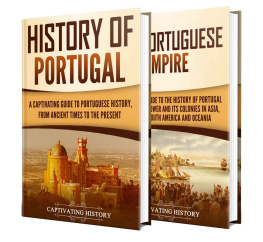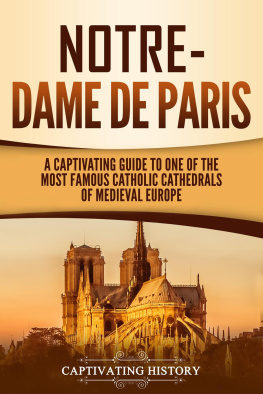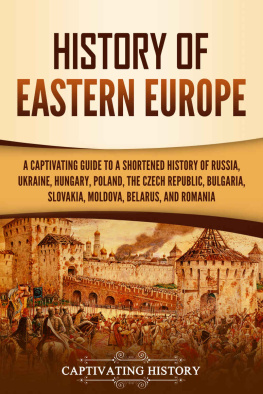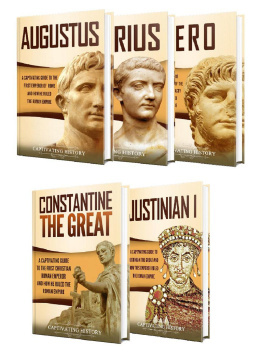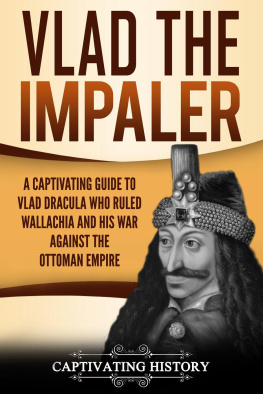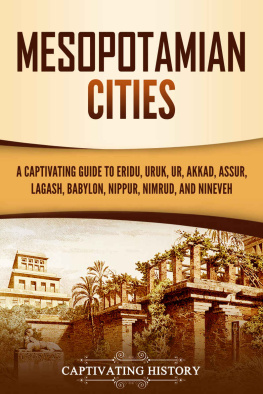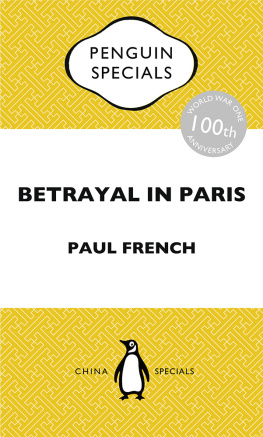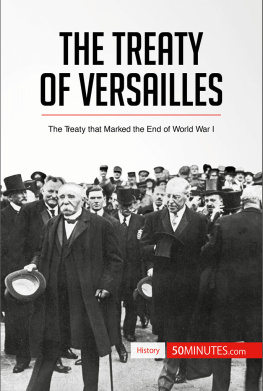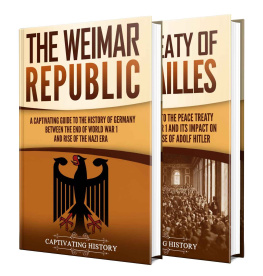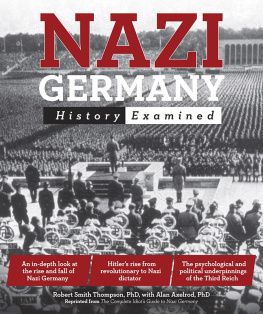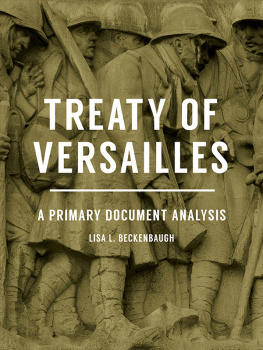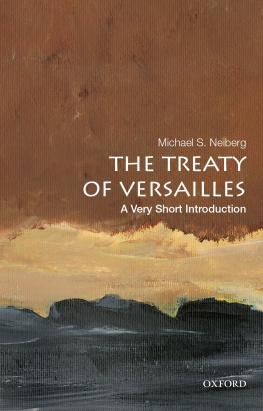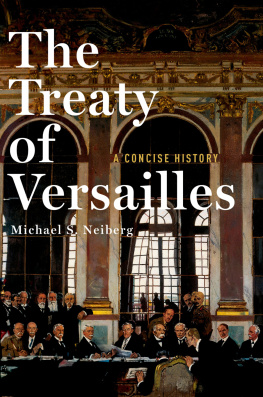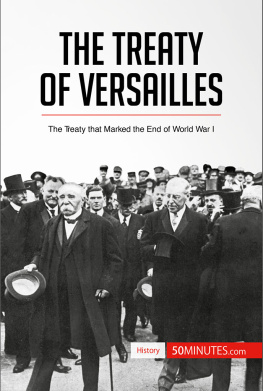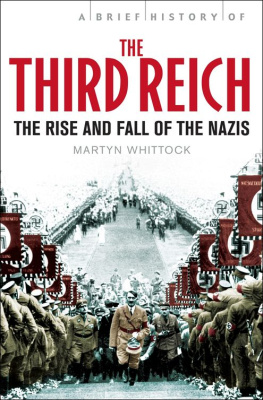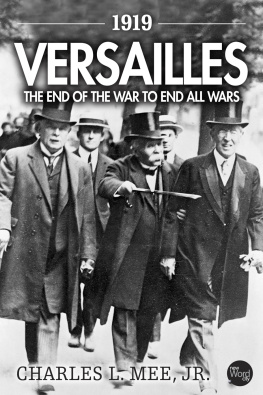Captivating History - The Treaty of Versailles: A Captivating Guide to the Peace Treaty That Ended World War 1 and Its Impact on Germany and the Rise of Adolf Hitler
Here you can read online Captivating History - The Treaty of Versailles: A Captivating Guide to the Peace Treaty That Ended World War 1 and Its Impact on Germany and the Rise of Adolf Hitler full text of the book (entire story) in english for free. Download pdf and epub, get meaning, cover and reviews about this ebook. year: 2020, genre: History. Description of the work, (preface) as well as reviews are available. Best literature library LitArk.com created for fans of good reading and offers a wide selection of genres:
Romance novel
Science fiction
Adventure
Detective
Science
History
Home and family
Prose
Art
Politics
Computer
Non-fiction
Religion
Business
Children
Humor
Choose a favorite category and find really read worthwhile books. Enjoy immersion in the world of imagination, feel the emotions of the characters or learn something new for yourself, make an fascinating discovery.

- Book:The Treaty of Versailles: A Captivating Guide to the Peace Treaty That Ended World War 1 and Its Impact on Germany and the Rise of Adolf Hitler
- Author:
- Genre:
- Year:2020
- Rating:5 / 5
- Favourites:Add to favourites
- Your mark:
- 100
- 1
- 2
- 3
- 4
- 5
The Treaty of Versailles: A Captivating Guide to the Peace Treaty That Ended World War 1 and Its Impact on Germany and the Rise of Adolf Hitler: summary, description and annotation
We offer to read an annotation, description, summary or preface (depends on what the author of the book "The Treaty of Versailles: A Captivating Guide to the Peace Treaty That Ended World War 1 and Its Impact on Germany and the Rise of Adolf Hitler" wrote himself). If you haven't found the necessary information about the book — write in the comments, we will try to find it.
Captivating History: author's other books
Who wrote The Treaty of Versailles: A Captivating Guide to the Peace Treaty That Ended World War 1 and Its Impact on Germany and the Rise of Adolf Hitler? Find out the surname, the name of the author of the book and a list of all author's works by series.
The Treaty of Versailles: A Captivating Guide to the Peace Treaty That Ended World War 1 and Its Impact on Germany and the Rise of Adolf Hitler — read online for free the complete book (whole text) full work
Below is the text of the book, divided by pages. System saving the place of the last page read, allows you to conveniently read the book "The Treaty of Versailles: A Captivating Guide to the Peace Treaty That Ended World War 1 and Its Impact on Germany and the Rise of Adolf Hitler" online for free, without having to search again every time where you left off. Put a bookmark, and you can go to the page where you finished reading at any time.
Font size:
Interval:
Bookmark:
All Rights Reserved. No part of this book may be reproduced in any form without permission in writing from the author. Reviewers may quote brief passages in reviews.
Disclaimer: No part of this publication may be reproduced or transmitted in any form or by any means, mechanical or electronic, including photocopying or recording, or by any information storage and retrieval system, or transmitted by email without permission in writing from the publisher.
While all attempts have been made to verify the information provided in this publication, neither the author nor the publisher assumes any responsibility for errors, omissions or contrary interpretations of the subject matter herein.
This book is for entertainment purposes only. The views expressed are those of the author alone, and should not be taken as expert instruction or commands. The reader is responsible for his or her own actions.
Adherence to all applicable laws and regulations, including international, federal, state and local laws governing professional licensing, business practices, advertising and all other aspects of doing business in the US, Canada, UK or any other jurisdiction is the sole responsibility of the purchaser or reader.
Neither the author nor the publisher assumes any responsibility or liability whatsoever on the behalf of the purchaser or reader of these materials. Any perceived slight of any individual or organization is purely unintentional.
Hi History Lovers!
My name is Matt Clayton, and Im the creator of Captivating History. First off, I want to THANK YOU for reading our books in the Captivating History series. As an avid reader of History myself, I aim to produce books that will hold you captive.
Now you have a chance to join our exclusive history list so you can get the ebook below for free as well as discounts and a potential to get more history books for free! Simply click the link below to join.
P.S. If you join now, you will also receive a free Mythology book. Remember that its 100% free to join the list.

Click here to access your bonus
Also, make sure to follow us on:
Twitter: @Captivhistory
Facebook: Captivating History: @captivatinghistory
Introduction
For six months in 1919, from the beginning of January to the end of June, the eyes of much of the world were on the French capital, Paris. The city was accustomed to being at the center of world events. It had seen the rise and fall of the Celts, Romans, and Franks. It had seen Viking raids too many to count, not to mention palace intrigue, revolution, and wars. Paris was perhaps the cultural hub of the world from the mid-1600s to the 20 th century.
However, its importance has not waned in recent years. The world held its breath when Notre Dame Cathedral in Paris caught fire in April 2019. For many French Catholics, Notre Dame is just as much a part of their faith as communion. The rest of the world watched the cathedral burn, hoping that it would remain standing and that its relics would be saved, as many see it as a symbol of Western civilization and one of the most important centers of cultural and artistic history in the world.
France, besides its inspirational and historic buildings, has played an important role in the world in other ways as well. For centuries, French was the language of diplomacy. The term lingua franca is used to describe a language that is universally used to make communication between disparate peoples and languages possible. It literally means language of the Franks, the tribe after which France is named. Though its literal meaning refers to French, today, the lingua franca of diplomacy, economics, and much else is English. Perhaps in fifty to one hundred years, it will be Mandarin Chinese. Only time will tell.
This might seem like an odd set-up, but it demonstrates the central role that France, Paris, and the French have played in world history. And they would play such a role again in 1919, as Paris would be the setting for the diplomatic conference that would put an end to World War I. The treaty that ended the war, also known as the war to end all wars, was signed at the Palace of Versailles, which had been the home of French kings until 1789 and remains one of the most beautiful structures in the world.
Though the men of Versailles (and they were overwhelmingly men) had arrived in Paris to put an end to World War I, by the time the conference ended, the main goal of the diplomats and national leaders had turned into ending wars for all time.
Obviously, that did not work, and as a matter of fact, the end result of the Paris Peace Conferencethe Treaty of Versailleswould likely cause more wars than any of its authors could have possibly dreamed of, including World War II.
In 1919, the victorious powers of World War I met in Paris and its (formerly) royal suburb of Versailles to hammer out a treaty that would put a formal end to the war, which had ended on the battlefield in November 1918. The Treaty of Versailles, which was just one of the many products of the talks between nations, is so important to learn about in order to understand what came after it, as it impacts the world today. For example, the modern Middle East is a construct of the Paris Peace Conference, and the boundaries of the nations as they stand today were artificially constructed by the victorious European powers in 1919. As you likely know, wars have been fought not only over these boundaries but also over many other issues that were decided in France at the beginning of the 20 th century.
The matters taken under consideration at the Paris Peace Conference were so numerous and so vast in their scope that no one there could recall a moment in history in which so many powers had come together to discuss the many issues affecting people around the globe.
The only example from history that the leaders and diplomats had to look to for guidance was the talks that took place after the fall of Napoleon in 1814. The talks, which are referred to by historians as the Congress of Vienna, decided matters pertaining to Europe (and only Europe) after the turbulent period of the French Revolution and Napoleon Bonaparte.
The Congress of Vienna established what came to be called the Concert of Europe. In theory, the nations of Europe would act in concert with each other to prevent the rise of another revolutionary power, such as France had been from 1789 to 1815. In very general terms, what the Concert of Europe meant was that the great powers (Britain, Prussia, Austria-Hungary, and Russia) would ensure that conservative forces, which refers to the aristocracy of those nations, would keep radicals from coming to power in Europe again. To this end, the former royal family of France, the Bourbons, was restored. This situation lasted from 1815 to about 1848, which was when liberal revolutions and ideas spread once again through Europe.
In 1919, the Congress of Vienna was the only model the men at the Paris Peace Conference had. It was not enough, for while the wars of the French Revolution and Napoleon had been devastating, they were nothing compared to the scale of death and destruction of the First World War. The men of the Congress of Vienna were dealing with the aftermath of the wars, as well as the impact of the French Revolution, which had changed the way people in Europe looked at government and society. The Paris Peace Conference, on the other hand, was global in its scope and dealt with not only how to put a permanent end to World War I but also how to end war for all time, and that was just one of the hundreds of topics it addressed.
Font size:
Interval:
Bookmark:
Similar books «The Treaty of Versailles: A Captivating Guide to the Peace Treaty That Ended World War 1 and Its Impact on Germany and the Rise of Adolf Hitler»
Look at similar books to The Treaty of Versailles: A Captivating Guide to the Peace Treaty That Ended World War 1 and Its Impact on Germany and the Rise of Adolf Hitler. We have selected literature similar in name and meaning in the hope of providing readers with more options to find new, interesting, not yet read works.
Discussion, reviews of the book The Treaty of Versailles: A Captivating Guide to the Peace Treaty That Ended World War 1 and Its Impact on Germany and the Rise of Adolf Hitler and just readers' own opinions. Leave your comments, write what you think about the work, its meaning or the main characters. Specify what exactly you liked and what you didn't like, and why you think so.

